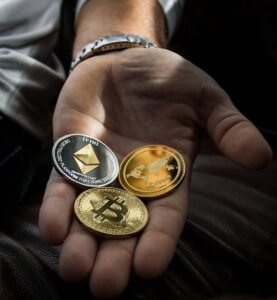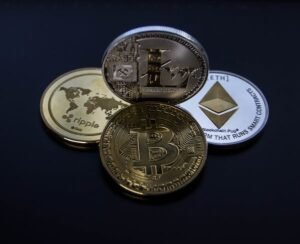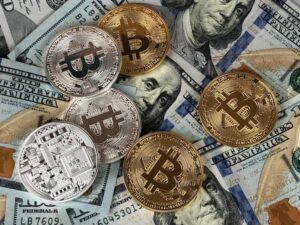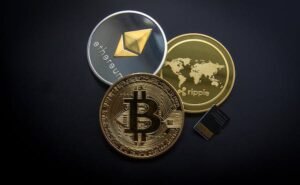Decentralized Finance, often abbreviated as DeFi, is a groundbreaking concept that is revolutionizing the traditional financial landscape. In essence, DeFi refers to a decentralized system of financial applications and services built on blockchain technology. This innovative approach aims to provide a more inclusive, efficient, and transparent financial ecosystem accessible to anyone with an internet connection. In this article, we’ll delve into the intricacies of DeFi, exploring its workings, advantages, challenges, and its potential to shape the future of banking.
What is DeFi?
At its core, DeFi represents a paradigm shift away from centralized financial systems towards decentralized alternatives. Unlike traditional banking services that rely on intermediaries such as banks or brokers, DeFi platforms leverage blockchain technology to facilitate peer-to-peer transactions directly between users. This eliminates the need for middlemen, thereby reducing costs, increasing efficiency, and enhancing security.
How Does DeFi Work?
Blockchain technology serves as the foundation of DeFi, providing a secure and immutable ledger for recording transactions. Smart contracts, self-executing contracts with the terms of the agreement directly written into code, automate the execution of transactions without the need for intermediaries. Decentralized applications (DApps) built on blockchain networks enable users to access a wide range of financial services, including lending, borrowing, trading, and asset management.
Advantages of DeFi
One of the key advantages of DeFi is its accessibility and inclusivity. By leveraging blockchain technology, DeFi platforms enable anyone with an internet connection to access financial services, regardless of their location or socioeconomic status. Furthermore, DeFi eliminates the need for intermediaries, reducing barriers to entry and empowering individuals to have full control over their financial assets. Additionally, the transparent and immutable nature of blockchain technology enhances security and trust among users.
Popular DeFi Projects
Several DeFi projects have gained prominence in recent years, each offering unique financial services and solutions. Uniswap, a decentralized exchange (DEX) protocol, facilitates seamless token swaps through automated liquidity pools. Compound Finance allows users to lend and borrow digital assets in a decentralized manner, earning interest or paying borrowing fees based on market demand. Aave, another prominent DeFi platform, offers decentralized lending and borrowing services with innovative features such as flash loans.
Challenges in DeFi
Despite its potential, DeFi also faces various challenges that need to be addressed for widespread adoption. Security risks, including smart contract vulnerabilities and hacking incidents, pose significant threats to DeFi platforms and users. Regulatory uncertainty remains another major challenge, with governments around the world grappling with how to regulate decentralized financial systems. Additionally, scalability issues related to blockchain networks can hinder the performance and usability of DeFi applications.
The Future of Banking with DeFi
The rise of DeFi has the potential to disrupt traditional banking systems by offering alternative financial services that are more efficient, accessible, and inclusive. By leveraging decentralized technologies, DeFi can provide financial empowerment to the unbanked and underbanked populations, opening up new opportunities for economic participation and growth. Furthermore, DeFi has the potential to drive global financial inclusion by overcoming geographical and regulatory barriers.
Investing in DeFi
Investing in DeFi offers both opportunities and risks for investors. While DeFi projects have the potential for high returns, they also come with inherent risks such as smart contract vulnerabilities, market volatility, and regulatory uncertainty. Diversification strategies, thorough research, and a long-term investment outlook are essential for navigating the complexities of the DeFi landscape.
Government Regulations and DeFi
The regulatory landscape surrounding DeFi is still evolving, with regulators grappling with how to address the unique challenges posed by decentralized financial systems. While some countries have embraced DeFi with open arms, others have expressed concerns about its potential for illicit activities and systemic risks. Moving forward, a balanced approach to regulation that fosters innovation while protecting users’ interests will be crucial for the sustainable growth of the DeFi industry.
The Role of Stablecoins in DeFi
Stablecoins, cryptocurrencies pegged to stable assets such as fiat currencies or commodities, play a crucial role in the DeFi ecosystem. By providing price stability and liquidity, stablecoins enable users to transact and store value on DeFi platforms without being exposed to the volatility of traditional cryptocurrencies like Bitcoin or Ethereum. Additionally, stablecoins serve as a bridge between the traditional financial system and the world of DeFi, facilitating seamless on-ramps and off-ramps for users.
Decentralized Exchanges (DEXs) vs. Centralized Exchanges (CEXs)
Decentralized exchanges (DEXs) and centralized exchanges (CEXs) represent two distinct paradigms for trading digital assets. While centralized exchanges offer liquidity, speed, and user-friendly interfaces, they also pose security and censorship risks due to their reliance on centralized infrastructure. In contrast, DEXs leverage decentralized technologies to provide trustless and censorship-resistant trading environments, albeit with lower liquidity and usability in some cases. Both DEXs and CEXs have their respective advantages and disadvantages, and the choice between them ultimately depends on the user’s preferences and priorities.
DeFi and Traditional Banking Integration
Despite being disruptive to traditional banking systems, DeFi also presents opportunities for collaboration and integration. By leveraging the strengths of both decentralized and centralized financial systems, synergies can be created to provide enhanced financial services to users. For example, traditional banks can partner with DeFi platforms to offer innovative products and services, while DeFi projects can benefit from the expertise and regulatory compliance of established financial institutions. Bridging the gap between DeFi and traditional finance is essential for driving mainstream adoption and unlocking the full potential of decentralized finance.
Security Measures in DeFi
Given the inherent risks associated with decentralized finance, implementing robust security measures is paramount. Users should exercise caution when interacting with DeFi platforms, conducting thorough due diligence and using trusted sources of information. Best practices such as using hardware wallets, enabling two-factor authentication, and avoiding unauthorized third-party applications can help mitigate the risk of hacks and frauds. Additionally, participating in decentralized governance processes and staying informed about security best practices are essential for protecting one’s assets in the rapidly evolving DeFi landscape.
The Impact of DeFi on Global Economy
The widespread adoption of DeFi has the potential to reshape the global economy by democratizing access to financial services and fostering economic growth. By empowering individuals to participate in the financial system without the need for intermediaries, DeFi can drive financial inclusion and reduce inequalities. Furthermore, the efficiency and transparency of DeFi platforms can streamline capital allocation, spur innovation, and unlock new opportunities for wealth creation. As DeFi continues to evolve and mature, its impact on the global economy is likely to become increasingly significant, paving the way for a more equitable and sustainable financial future.
Educational Resources for DeFi
For those looking to learn more about DeFi, there are a wealth of educational resources available online. Websites such as DeFi Pulse and CoinGecko provide comprehensive insights into the latest trends, protocols, and projects in the DeFi space. Forums and communities such as Reddit’s r/defi and Discord channels offer platforms for discussion and knowledge sharing among DeFi enthusiasts. Additionally, DeFi-focused podcasts and blogs, such as Bankless and The Defiant, provide valuable insights and analysis from industry experts. By leveraging these resources, individuals can stay informed and empowered to navigate the complexities of the DeFi landscape effectively.
Conclusion
In conclusion, Decentralized Finance (DeFi) represents a revolutionary paradigm shift in the world of banking and finance. By leveraging blockchain technology, smart contracts, and decentralized applications, DeFi offers a more inclusive, efficient, and transparent alternative to traditional financial systems. Despite facing challenges such as security risks and regulatory uncertainties, DeFi has the potential to drive global financial inclusion, empower individuals, and reshape the global economy. As the DeFi ecosystem continues to evolve and mature, it is essential for stakeholders to collaborate, innovate, and prioritize security to unlock the full potential of decentralized finance.
FAQs (Frequently Asked Questions)
- Is DeFi safe to invest in?
- While DeFi offers lucrative investment opportunities, it also comes with inherent risks. Investors should conduct thorough research and exercise caution when participating in DeFi projects.
- How can I get started with DeFi?
- To get started with DeFi, you can explore popular platforms such as Uniswap or Compound Finance and familiarize yourself with the basics of blockchain technology and smart contracts.
- What are the regulatory challenges facing DeFi?
- DeFi faces regulatory challenges related to compliance, taxation, and consumer protection. Regulators are still grappling with how to address the unique characteristics of decentralized financial systems.
- What are the advantages of using stablecoins in DeFi?
- Stablecoins offer price stability and liquidity, making them ideal for conducting transactions and storing value on DeFi platforms. They also serve as a bridge between traditional finance and the world of DeFi.
- How can I ensure the security of my assets in DeFi?
- To ensure the security of your assets in DeFi, you should use hardware wallets, enable two-factor authentication, and avoid interacting with unauthorized third-party applications. Additionally, staying informed about security best practices and participating in decentralized governance processes can help mitigate risks.




